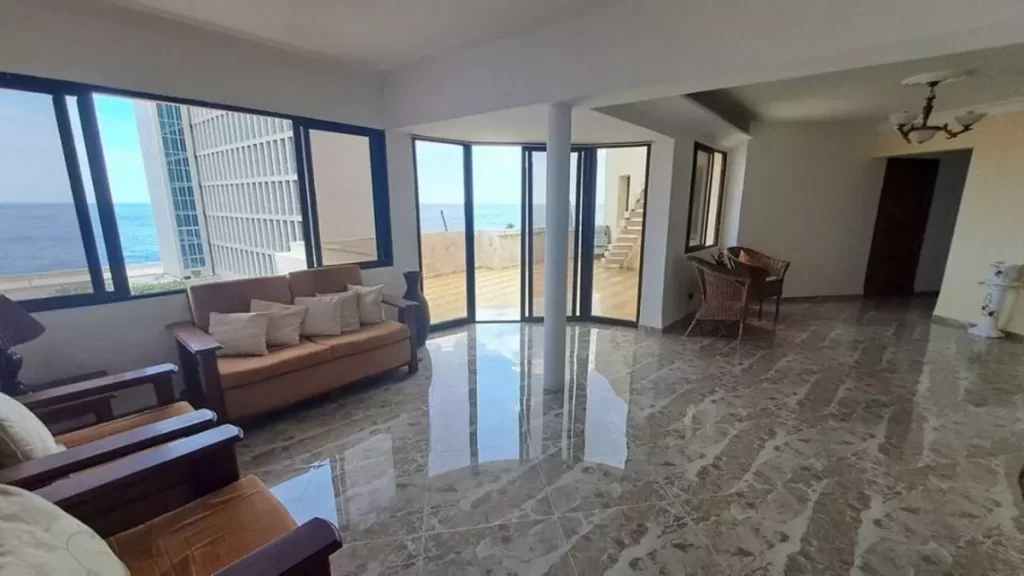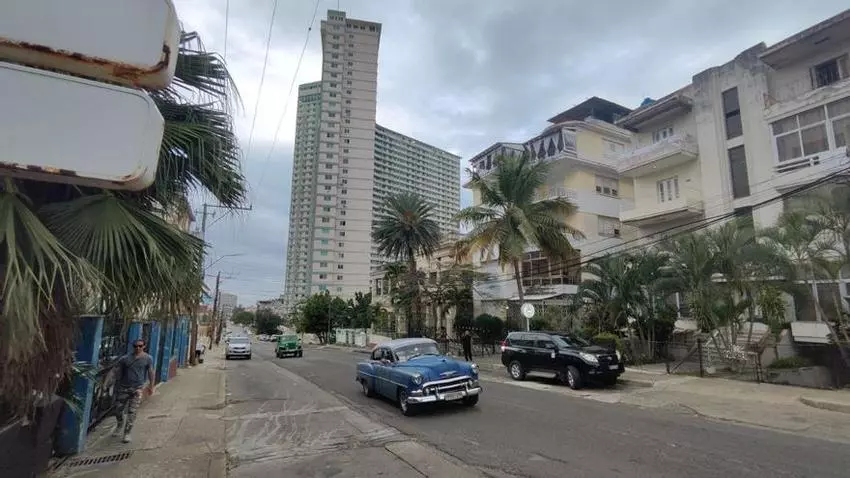Even some of the gigantic mansions in Siboney confiscated by the Revolution are for sale.

![]() 14ymedio, Natalia López Moya/Juan Diego Rodríguez, Havana, 3 April 2024 — Juan Carlos divides his time between Milan and Havana. The 52-year-old’s children, wife and parents all live in Italy but, for more than two years, he has been trying to sell an old mansion in Havana’s Vedado district which has caused him “more headaches than happiness.” Located a few yards from Línea Street, the house was a project that fulfilled a life-long dream that, as he puts it, “blossomed then failed.”
14ymedio, Natalia López Moya/Juan Diego Rodríguez, Havana, 3 April 2024 — Juan Carlos divides his time between Milan and Havana. The 52-year-old’s children, wife and parents all live in Italy but, for more than two years, he has been trying to sell an old mansion in Havana’s Vedado district which has caused him “more headaches than happiness.” Located a few yards from Línea Street, the house was a project that fulfilled a life-long dream that, as he puts it, “blossomed then failed.”
In the late 1990s, Juan Carlos received a scholarship to study art at an Italian university. When he left José Martí International Airport, he knew there was no going back and that he had to make a life for himself outside the island. “I had always lived with my parents and my sisters in a small apartment, so from a very young age my dream was to have my own home, one that was spacious, bright and had an area I could use as my studio.”
Ultimately, Juan Carlos married an Italian woman and, in 2014, began the process of repatriating to Cuba. He had lost his residency status after not visiting his country for several years. “There was a lot of excitement and several of my artist and designer friends were part of a wave of people getting Cuban identity cards again.”
One of the benefits of having Cuban residency is the ability to buy a house. “At the time, my wife and I were making good money. Her father had also died and left her a sizable inheritance so we decided to buy the place in Vedado. It was my life-long dream and I was finally able to make it come true.”
One of the benefits of having Cuban residency is the ability to buy a house. “It was my life-long dream and I was finally able to make it come true.”
One of the benefits of having Cuban residence is the ability to buy a house. “At the time, my wife and I were making good money. Her father had also died and left her a sizable inheritance so we decided to buy the place in Vedado. It was my life-long dream and I was finally able to make it come true.”
Juan Carlos reports that it cost almost as much to repair the house as it did to buy it. Other problems cropped up once constrution was underway: rusted beams, dampness in the walls, issues with the concrete. They even had to redo some of the column capitals. “They started coming apart as we were painting them.”
The process was long and costly. “I had to go to Cuba five times a year so, in addition to construction expenses, there was the cost of airline tickets. It seemed like the house was eating money. Every month we spent thousands of dollars to restore and maintain it. We had to hire two custodians to make sure our building materials weren’t stolen.”
Finally, in April 2022, six years after buying the house, the work was done.

Juan Carlos describes it as “a dream come true.” But, by then, he no longer wanted to own property in Cuba. “I had spent long periods in Havana and everything was deteriorating a lot. I thought about how to make some money out of it, maybe by renting it to a diplomat, or to an entrepreneur who wanted to open a restaurant. But I realized that doing that would have meant spending all my time keeping an eye on the place because [as the old saying goes] ’it’s the owner’s eye makes the horse fat.’”
In May of that same year, he decided to put the newly furnished home up for sale. The problem now, however, is that no one wants to buy it. “I have to list it with several real estate agencies and I’ve also dropped the price several times. I am currently asking $150,000 for everything but it’s been two years and, so far, there are no takers.” The island’s residential real estate market is saturated due to the mass exodus that is bleeding the country.
A quick look at local real estate listings says it all. A colonial-style house in Vibora Park that has been outfitted to operate as a nightclub, described as “a golden opportunity,” is on the market for $60,000, with 80% its contents included (“from wines to coffee makers,” the listing states). A 120-square-meter apartment in Vedado with seaside views is for sale at $80,000. A “recreation estate” with a four-bedroom house and a 1,450-square-meter extension is available for $50,000.
Though many of the listings do not indicate prices, there are lots of photos suggesting a high degree of luxury
Other listings suggest there has been some haggling going on. The asking price for penthouse in Vedado, covered in marble and with the ocean below — its elderly owner is also visible in the photos — has gone from $270,000 to $190,000.
Though many of the listings do not indicate prices, there are lots of photos suggesting a high degree of luxury, most of them taken after obviously expensive remodelings. One of them is a 1950s property in Nuevo Vedado with seven bedrooms, four bathrooms, a patio, terrace and jacuzzi. Then there is one of the spacious apartments in the Geralt Sisters Building, completed in 1958 with all the latest amenities of its era. Its exterior is now falling to pieces after years of neglect.
One of the problems when selling these houses is that anyone who dares set foot in the neighborhoods where they are located is scared away. This is the case with an apartment in San Lázaro. Advertised as a “luxury penthouse with ocean views in the heart of the city” in Central Havana, it is surrounded by ruined buildings and piles of garbage on every street corner.
Another quirk of the saturated real estate market is that now even the enormous mansions in Siboney, which were confiscated after Cuban Revolution by the regime’s leaders, are up for sale. The problem here is that, because they were nationalized after their original owners were exiled, they could be subject to future lawsuits.
Rita, a Cuban who works as a private residential real estate agent, explains the situation: “Before, these types of properties were handled with some discretion by an agency. Now, the owners are so desperate to sell that they post the listings themselves on Facebook for all to see.”
“I’m not going back to Cuba, which means I will lose my residency status once I have been out of the country for twenty-four months, but I don’t care anymore”
What owners like Juan Carlos want is to move their money out of Cuba. “It’s a large amount and I will have a lot of problems when the time comes. But everyone is in the same boat. They want hard currency and they want it to take overseas,” he says.
His plan is to wait a few months, then reduce the price. He does not plan on going back to Cuba once the property is sold. “I will lose my residency status once I have been out of the country for twenty-four months but I don’t care anymore,” he says.
“I thought my sons would grow up in this house, that Cuba would grow and move forward, but I was wrong. Between one thing and another, this venture has cost me and my wife more than a quarter million dollars,” says Juan Carlos, who has some mixed feelings about his house. “It’s very pretty. In Milan a house like this would have cost me a fortune but now no one wants to live in Cuba now.”
With its stained glass windows, long marble staircase, imported black granite in the kitchen, stately bathtubs and enormous mirrors in the living room, the mansion — like so many other Cuban properties whose owners once dreamed of living and growing old on the island — is still on the market, waiting for a buyer.
____________
COLLABORATE WITH OUR WORK: The 14ymedio team is committed to practicing serious journalism that reflects Cuba’s reality in all its depth. Thank you for joining us on this long journey. We invite you to continue supporting us by becoming a member of 14ymedio now. Together we can continue transforming journalism in Cuba.
